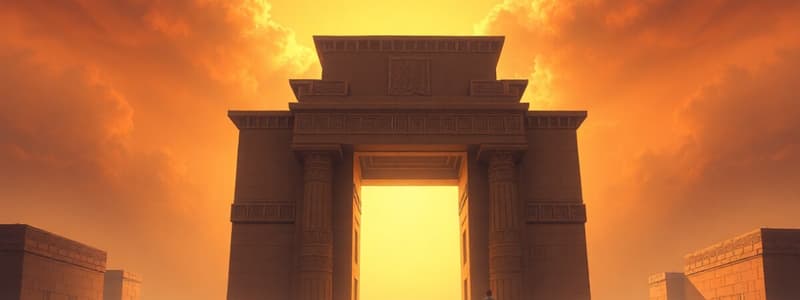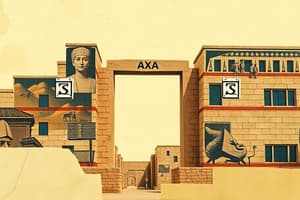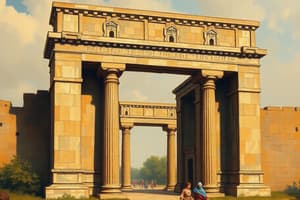Podcast
Questions and Answers
What geographic feature does the term 'Mesopotamia' refer to?
What geographic feature does the term 'Mesopotamia' refer to?
- Land between two mountains
- Land between two deserts
- Land between two oceans
- Land between two rivers (correct)
Which period marks the beginning of the Mesopotamian civilization?
Which period marks the beginning of the Mesopotamian civilization?
- 4000 BCE
- 3000 BCE
- 3500 BCE (correct)
- 500 BCE
Which civilization is recognized as the heart of the Mesopotamian civilization?
Which civilization is recognized as the heart of the Mesopotamian civilization?
- Sumer (correct)
- Babylonia
- Akkad
- Assyria
What was a significant architectural feature found in Mesopotamian city-states?
What was a significant architectural feature found in Mesopotamian city-states?
Who conquered the Mesopotamian civilization around 539 BCE?
Who conquered the Mesopotamian civilization around 539 BCE?
Which of the following ancient cities was NOT mentioned as a major city of Mesopotamia?
Which of the following ancient cities was NOT mentioned as a major city of Mesopotamia?
What was the primary reason for battles among Mesopotamian city-states?
What was the primary reason for battles among Mesopotamian city-states?
What does the term 'Civilisation of the Crescent' refer to?
What does the term 'Civilisation of the Crescent' refer to?
What does the term 'cuneiform' derive from?
What does the term 'cuneiform' derive from?
How did the cuneiform script evolve over time?
How did the cuneiform script evolve over time?
Which of the following best describes the Mesopotamian system of time measurement?
Which of the following best describes the Mesopotamian system of time measurement?
What factor contributed to the decline of Mesopotamian civilization after 500 BCE?
What factor contributed to the decline of Mesopotamian civilization after 500 BCE?
What unique characteristic did Mesopotamian civilization have regarding its calendar?
What unique characteristic did Mesopotamian civilization have regarding its calendar?
What was one significant reason for the unhealthy rivalry in ancient Mesopotamia?
What was one significant reason for the unhealthy rivalry in ancient Mesopotamia?
How did the Euphrates River's change affect Mesopotamian civilization?
How did the Euphrates River's change affect Mesopotamian civilization?
Which ancient civilisations followed the achievements of Mesopotamian civilization?
Which ancient civilisations followed the achievements of Mesopotamian civilization?
What was the main purpose of canals in Mesopotamia?
What was the main purpose of canals in Mesopotamia?
Which class in Mesopotamian society held the highest rank?
Which class in Mesopotamian society held the highest rank?
What were the materials initially used for building houses in Mesopotamia?
What were the materials initially used for building houses in Mesopotamia?
Which of the following inventions was NOT developed by the Mesopotamians?
Which of the following inventions was NOT developed by the Mesopotamians?
What material did the Mesopotamians NOT use for making tools and ornaments?
What material did the Mesopotamians NOT use for making tools and ornaments?
How did the social structure of Mesopotamia classify prisoners of war?
How did the social structure of Mesopotamia classify prisoners of war?
What role did the king have in the administration of Mesopotamia?
What role did the king have in the administration of Mesopotamia?
Which type of trade route did Mesopotamian merchants commonly utilize?
Which type of trade route did Mesopotamian merchants commonly utilize?
What is a ziggurat in the context of Mesopotamian civilization?
What is a ziggurat in the context of Mesopotamian civilization?
Which feature distinguished Mesopotamian architecture from other ancient civilizations?
Which feature distinguished Mesopotamian architecture from other ancient civilizations?
What method did the Sumerians use to create the first form of writing?
What method did the Sumerians use to create the first form of writing?
Which crop was NOT mentioned as being grown in Mesopotamia?
Which crop was NOT mentioned as being grown in Mesopotamia?
How were Mesopotamian gods typically represented in temples?
How were Mesopotamian gods typically represented in temples?
What key agricultural invention assisted in farming within Mesopotamia?
What key agricultural invention assisted in farming within Mesopotamia?
What did Mesopotamian merchants commonly bring back from trade with India?
What did Mesopotamian merchants commonly bring back from trade with India?
Flashcards are hidden until you start studying
Study Notes
Geography and Definition
- Mesopotamia translates to "the land between two rivers," situated between the Tigris and Euphrates rivers, flowing into the Persian Gulf.
- Bordered by the Arabian Desert to the west and Iranian mountains to the east.
Historical Context
- Birthplace of one of the world's earliest civilizations around 3500 BCE, known as the Mesopotamian civilization or the "Civilisation of the Crescent."
- Key regions included Sumer (southern part), Babylonia (northern), Akkad (central), and Assyria (northeast).
- The civilization lasted until around 500 BCE and saw the Sumerians, Babylonians, and Assyrians evolve through conquest and cultural assimilation, ending with Cyrus of Persia's conquest in 539 BCE.
City-States Structure
- Each city acted as the capital of a small city-state, controlling several hundred square kilometers and often engaged in conflicts for power and resources.
- Major cities included Babylon, Uruk, Eridu, Lagash, and Ur, each featuring a sacred area with a ziggurat for worship.
- Streets of cities were narrow and often dirty, with houses built from mud, reeds, and palm trees, later evolving to fired bricks.
Social Hierarchy
- Society was stratified: Kings at the top, followed by priests, officers, scribes, merchants, landowners, craftsmen, and the Lowest class, composed of prisoners and peasants.
- The constant threat of invasion necessitated a strong military presence, with free citizens required to serve.
Role of Kings
- Kings evolved from priest-kings to more autocratic figures seen as divine representatives responsible for defense, infrastructure, irrigation, and justice administration.
Economic Activities
- Agriculture was central, focusing on wheat, barley, and various crops, aided by advanced irrigation systems.
- Extensive trade networks linked Mesopotamia with distant lands, dealing in commodities such as grain, textiles, metals, and luxury items.
Trade and Transport
- Traders navigated routes to the Mediterranean and beyond, using wheeled carts for land transport and keleks for water transport.
- Mesopotamians engaged in trade with regions as far as Africa and India, notable for the exchange of grain for resources like copper and timber.
Artistic Advancements
- Mesopotamian architecture featured large public buildings and innovative use of materials such as glazed bricks, arches, columns, and domes.
- Ornate items like metal statues, gold ornaments, and inlaid furniture reflect rich artistry and craftsmanship.
Religious Beliefs
- Polytheistic society with gods like An, Enlil, Enki, and Marduk; each city had a patron god and ziggurat for worship.
- Rituals involved maintaining the ziggurat and offering to gods to ensure community favor.
Achievements
- Invention of the wheel and potter's wheel revolutionized transport and pottery.
- Development of cuneiform writing around 3000 BCE, using wedge-shaped markings on clay tablets for communication and record-keeping.
- Advances in astronomy included the division of the sky into constellations and a standardized time system based on a 60-unit counting method.
Decline of Civilisation
- The fall of the Mesopotamian civilization post-500 BCE attributed to foreign invasions, competition from rising city-states, and environmental changes such as the alteration of the Euphrates River leading to land desiccation.
- Despite its decline, the legacy of Mesopotamia provided foundational concepts for future civilizations.
Studying That Suits You
Use AI to generate personalized quizzes and flashcards to suit your learning preferences.




